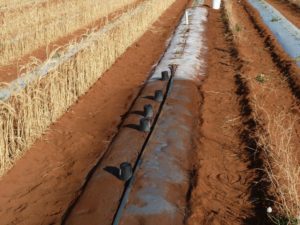Sprayable biodegradable polymer membrane for farming (TranspiratiONal2)
SIEF supports sprayable biodegradable polymer membrane technology for agricultural cropping systems (TranspiratiONal 2)
the challenge
To feed and clothe a global population expected to exceed 9 billion by 2050, the world needs to double current food production and radically increase fibre production. Farmers will have to achieve this using current arable land area, but with much less water, fewer nutrients, and less agrochemicals.
the response
A prototype water-based sprayable biodegradable polymer membrane has been developed that can be applied to the soil surface to reduce water evaporation and inhibit weed growth, thereby improving crop water productivity.
the collaboration
An expert team from CSIRO conducted large-scale field trials of the scalable polymer in collaboration with farmers.

A prepared crop bed with two different applications of the sprayable polymer (Image source: Keith Bristow)
projected impact
The outcomes of this project will help develop a commercial agricultural product ready for market entry, with projected impacts including:
- Helping Australian farmers to increase their water yield curves to improve crop production yields, generate higher income, and increase farm profitability, by reducing water availability risks and weed management costs.
- Reducing agriculture’s environmental impact by providing a substitute for the current practice of using non-biodegradable plastics and agrochemicals.
- Enriching Australian manufacturing supply chain sectors by developing a new agricultural product for large-scale production and distribution within domestic and export agricultural industries
- Boosting productivity, profitability, and improving ecosystem health for agricultural industries, and increasing food security in a resource and climate challenged world.
